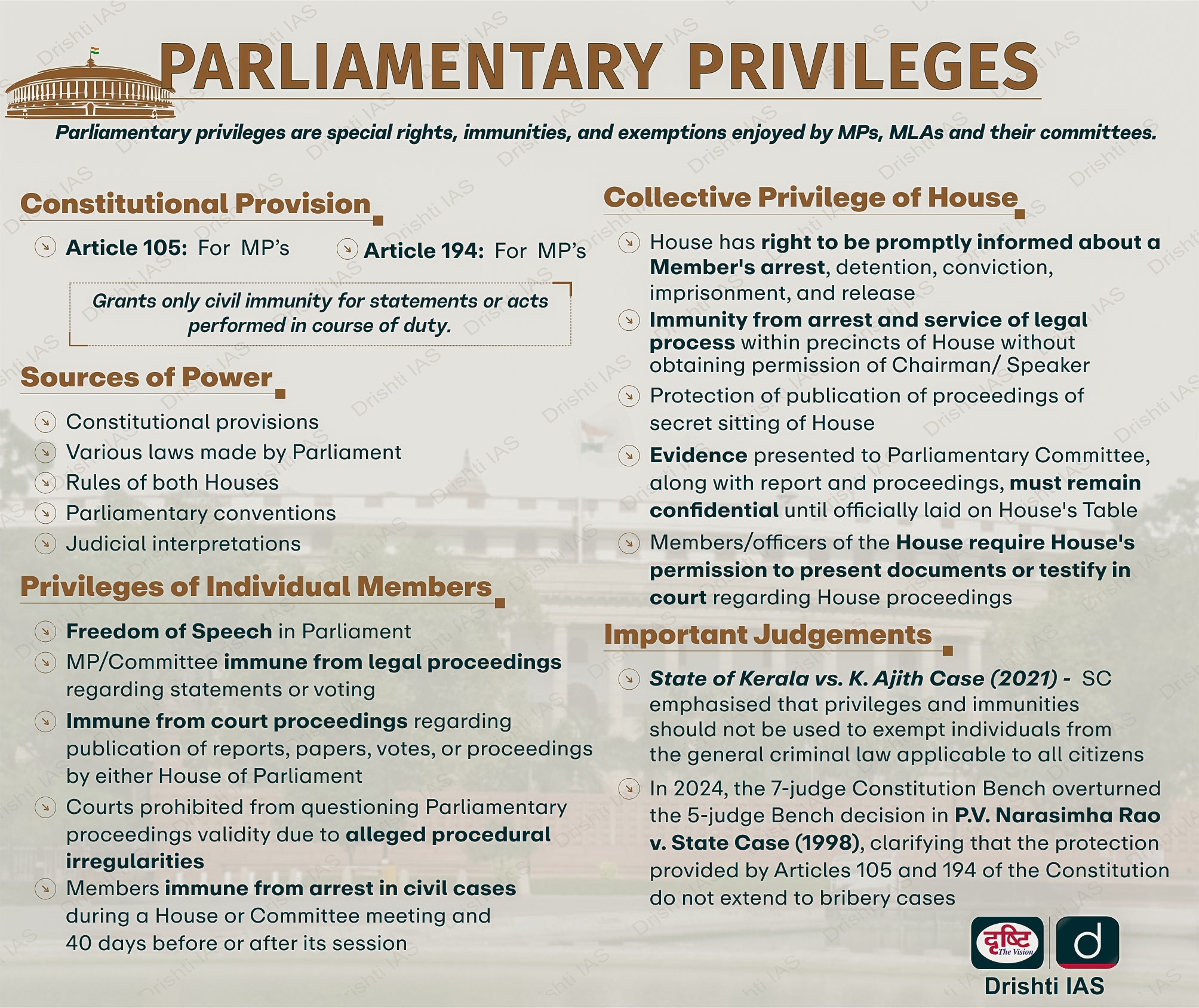Important Facts For Prelims
Breach of Privilege Notice
- 16 Jul 2024
- 5 min read
Why in News?
The main opposition party submitted a breach of privilege notice against the Prime Minister for making “derogatory” remarks against the former vice president and Chairman of the Rajya Sabha.
What is the Breach of Privilege?
- About:
- When any individual or authority undermines any of the privileges, rights, and immunities, either of the Members individually or of the House in its collective capacity, the offence is called a breach of privilege and is punishable by the House.
- Additionally, any actions that disrespect the House's authority or dignity, like ignoring its orders or insulting its members, committees, or officers, are considered breaches of privilege.
- Contempt of House vs Points Of Propriety:
- Contempt of House: It is defined generally as any act which obstructs either member or house of parliament in the performance of its duty and functions.
- Points Of Propriety: Parliament and its members must follow specific practices and conventions, and violating these is considered 'impropriety'.
- Power of Parliament To Punish:
- Each House of Parliament is the guardian of its own privileges.
- Courts of law in India have recognised that a House of Parliament (or a State Legislature) is the sole authority to judge as to whether or not there has been a breach of privilege of the House in a particular case.
- The House may punish a person found guilty of breach of privileges or contempt of the House either by reprimand or admonition or by imprisonment for a specified period.
- In addition, the house can punish its members in two other ways namely suspension from its service and expulsion.
- However, in case of unconditional apology by the member, house normally in interest of its dignity avoids pursuing the matter further.
- Procedure: The procedure for dealing with questions of privilege is laid down in Rules 187 to 203 of the Rules of Procedure and Conduct of Business in the Council of States (Rajya Sabha).
- A question of privilege may be raised in the House only after obtaining the consent of the Chairman.
- The question whether a matter is actually a breach of privilege or contempt of the House is entirely for the House to decide.
- Breach of Privilege by Member of Another House:
-
According to the 1954 Joint Report of the Committees of Privileges, when a breach of privilege involving House personnel is raised in either the Lok Sabha or Rajya Sabha, the Presiding Officer refers the case to the other House's Presiding Officer.
-
The latter handles it in the same manner as breach of their own House's privilege and reports back on the enquiry and actions taken.
UPSC Civil Services Examination, Previous Year Question (PYQ)
Prelims:
Q. With reference to the Parliament of India, which of the following Parliamentary Committees scrutinizes and reports to the House whether the powers to make regulations, rules, sub-rules, by-laws, etc., conferred by the Constitution or delegated by the Parliament are being properly exercised by the Executive within the scope of such delegation? (2018)
(a) Committee on Government Assurances
(b) Committee on Subordinate Legislation
(c) Rules Committee
(d) Business Advisory Committee.
Ans: (b)
Mains:
Q. The ‘Powers, Privileges and Immunities of Parliament and its members’ as envisaged in Article 105 of the Constitution leave room for a large number of un-codified and un-enumerated privileges to continue. Assess the reason for the absence of legal codification of the ‘parliamentary privileges’. How can this problem be addressed? (2014)






-min.jpg)